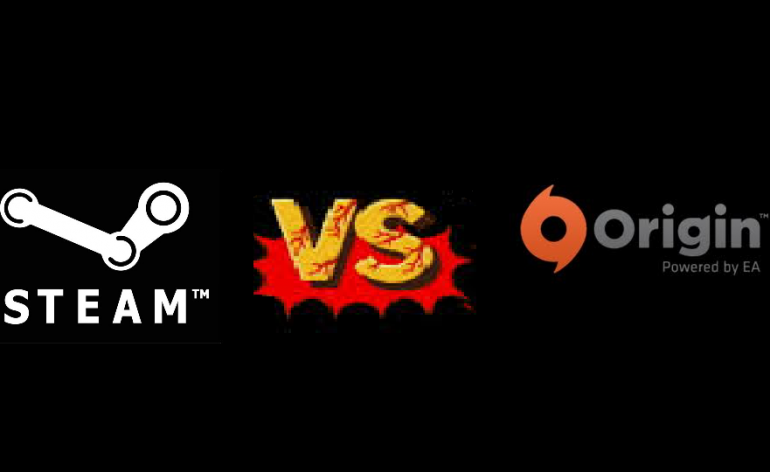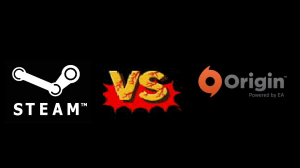What’s the best digital distribution platform for you?
Since you’re reading Dorkadia, I’m going to go out on a limb and presume that you’re familiar with at least one or two places to purchase and download games from the internet. Heck, they’re built into every modern console on the market and that’s probably not going to change anytime soon. So the real million dollar (quite literally for these companies) is which one or ones do you go with? Of course, depending on the games you want to play, sometimes you don’t have a choice. I both love and fear digital distribution platforms. They’re an amazing and convenient way to manage a library of games, but what would happen if the company you trusted with your library were to go bankrupt?
The case for digital distribution
You love games and you want to play the newest titles on release day, but you don’t really want to spend time hoping to find copies of them at a retail store. If you’re a PC or Mac gamer, you probably have a Steam account for this very reason. Hell, digital distribution is probably a key reason why you play on a computer, but that’s a debate for another time. Even consoles get in on digital distribution by way of PSN, XBLA, and Wii Ware. This stuff is everywhere, it’s fast (depending on your net connection), and easy. In most cases, your distribution platform is even going to keep track of your purchases so that you can delete and reinstall an old favorite later if you happen to have crammed your hard drive full of every game you can afford. Not that I do that… much.
The big fear
So digital libraries are a big ball of frickin awesome! But then there’s the big question of what would have happened if your digital library was being held by THQ instead of EA? Sure, another company might have picked up their distribution platform and saved you, but you might have also lost access to all of your games. At least with physical media, that’s not really a concern and physical copies come with the added option of selling games that you no longer play to places like GameStop, at least for now. So yes, once you buy a digital title you’re pretty much stuck with it in your virtual library and there’s no real guarantee how long that library is going to exist.
So what do you choose?
You certainly have an overwhelming variety of places to choose from. Presuming that your idea of digital downloads isn’t limited to being a pirate, purchasing games online is easy and can often be less expensive than buying a physical copy. Of course, it should always – seriously always – be fucking cheaper to buy bits of data than a disc, case, manual, and all the bullshit involved in producing, storing, and shipping physical games, but I digress.
I’m surprised when a place like Amazon sells a digital download for more than a physical copy that they have to ship to me. They are at least nice enough to maintain a library of your purchases for future download and they probably won’t go bankrupt again anytime soon. What you don’t get from them are things like automatic updates to your games when titles are patched.
GameFly has a proprietary desktop app through which they sell PC games. The bonus of that one is that if you happen to be a subscriber, you also have unlimited free access to a bunch of PC games so old and obscure that you’ll be a gaming hipster in no time when you tell people what you’ve been playing.
Have a thing for DRM free indie games? There’s a relatively new service out there for you called ShinyLoot. There’s no client to download and they don’t keep a library of your purchases. So do not lose that DRM free install file. What they do provide for select games is keys for Steam and/or Desura. Some of their pricing is questionable, so make sure you shop around if you don’t care about DRM.
Desura is a distribution platform focused on providing games and mods to end users. They’re not something that really piques my interest, but they could easily be a platform to watch with enough support from some big name studios. Frankly, I know a lot of people that love to add mods to their games and having a platform that automatically updates those mods would be ideal for them.
Speaking of big name studios, EA apparently felt that it needed to have its own distribution platform. So if you really love the crap out of EA and Bioware games, you’ve probably installed Origin because they force you to do so. Yes, I’m biased against Origin. Then again, I really don’t have an interest in Sims games, so I wouldn’t even use Origin if not for Mass Effect 3. The big bonus is that some of your game keys for older games on Steam (like the Dragon Age series) are also valid on Origin.
Which leads me to the heavyweight in the room (which I’ve already mentioned twice), Steam. Valve made Steam the example of how to do DRM right years ago and it’s still going strong. Not only do you get a library of games, automatic updates, and awesome sales like most of the above, but they also offer an offline mode. So yes, you can take any single player game on the road with you on your laptop and play without an internet connection if you want.
My recommendation: spread the love
Even though I doubt that the Justice Department is going to subpoena game purchase records to hunt for terrorists, there are potential dangers with sticking to a single source for games distribution. While I’m personally a big fan of Steam, I can’t advise anyone to put all of their money into a single system. Sure, they’re probably not going anywhere, but who knows? Obviously console users don’t really get a choice unless they own multiple consoles which not everyone can shell out the cash for. For you computer gamers, the net is a cornucopia of delicious downloads. Go forth and sample its digital fruits.







